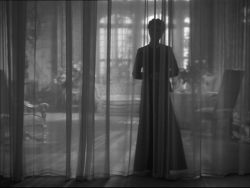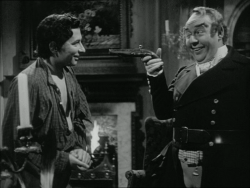by NEIL SINYARD

I was tempted to sub-title this talk ‘The Mistress of Romance meets The Master of Suspense’, except that there’s more to Daphne du Maurier than Romance and more to Alfred Hitchcock than Suspense. Actually, to the best of my knowledge, they never did meet, certainly not socially, and there are slightly unusual aspects to this. For example, Hitchcock was actually a friend of Daphne’s father, Sir Gerald du Maurier, who appeared in one of his films, Waltzes from Vienna (1933) and whom Hitchcock described to François Truffaut as ‘in my opinion, the best actor anywhere’. He did want to make a film of one of the Bulldog Drummond stories with Gerald du Maurier; and it is sometimes said that the main character of one of Hitchcock’s early talkies, Murder (1930) – about a distinguished actor who is on a jury that finds a young woman guilty of murder but who then begins to suspect that there may have been a miscarriage of justice – was actually modelled on Gerald du Maurier. (The part is played in the film by Herbert Marshall.) Both of them, incidentally, were great practical jokers and Hitchcock’s most successful one played on Sir Gerald was an occasion when he invited him to a fancy dress party. Sir Gerald turned up in greasepaint and wearing a kilt, only to discover that it was a formal black tie and tails affair, and he had to bid a hasty retreat.

The fact that Hitchcock knew father Sir Gerald much better than daughter Daphne is also striking because Hitchcock was to adapt three of Daphne du Maurier’s works for the screen. Of the 50-odd feature films Hitchcock made, most of which are adaptations of novels, short stories or plays, there is no other writer I can think of offhand whom Hitchcock adapts more than once, and yet there are three du Maurier adaptations. One of them, Jamaica Inn, which was the last film he made in England before his departure to America in 1939, is self-confessedly one of his lesser works. Hitchcock himself described it as ‘an absurd thing to undertake’, and one of the best critics of Hitchcock’s English period, Charles Barr has said that ‘it is almost alone among Hitchcock’s films in containing no felicitous scene or line or detail that gets remembered and quoted, or that deserves to be’. The other two, however, Rebecca (1940) and The Birds (1963) are two of Hitchcock’s most important films, and two particularly fascinating examples of du Maurier adaptations for the screen, because they could not be further apart: one, a novel, the other a short story, so one requires compression whilst the other requires expansion; and one that sticks fairly close to the original text, whereas the other departs almost completely from the original apart from retaining the basic situation. Not surprising perhaps that the author herself was said to be delighted with the first and horrified by the second.
Still, it does prompt the question: what was it about Daphne du Maurier’s work that stimulated Hitchcock’s interest and encouraged him to adapt her more than any other author? I think there were two things that Hitchcock particularly responded to:
